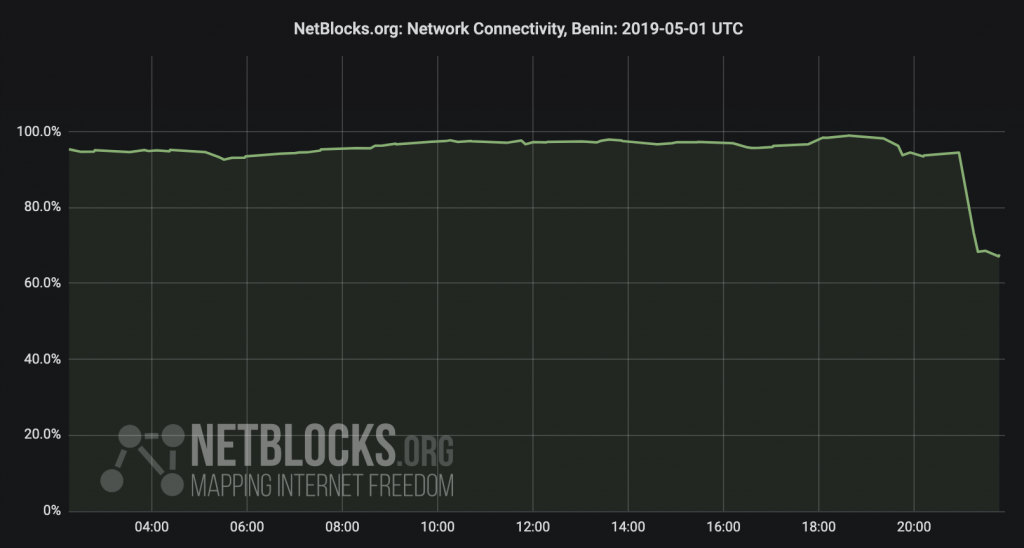Internet access has been partially disrupted in Benin as of 9:00 PM UTC, Wednesday 1 May 2019, after a controversial election during which the country was entirely disconnected for most of the day. Riots broke out after former president Thomas Boni Yayi called for an election boycott, and tanks reportedly circled his home sparking further anger. Network round trip latency timings show strong indications that service may be slowed, or throttled, to make internet usage difficult without entirely severing connectivity.
Update: Service has been restored as of 7:30 a.m UTC Thursday 2 May 2019.
Alert: Internet service partially disrupted again in #Benin amid riots following Sunday's elections; official government accounts cautioned against "fake news" as outage began; incident ongoing #KeepItOn ⬇️https://t.co/40aHRj1UlA pic.twitter.com/aXuL1RwA0P
— NetBlocks (@netblocks) May 1, 2019
The disruption came minutes before as the official government Twitter account warned citizens not to share “fake news”:
Le gouvernement invite les béninois à s'informer via ses canaux digitaux officiels sur Facebook et Twitter pour éviter l'exposition aux rumeurs et fausses nouvelles qui pourraient exister à travers les médias sociaux et autres canaux officieux.#wasexo #vote229 pic.twitter.com/uwMrF8C8Fw
— Gouvernement du Bénin ?? (@gouvbenin) May 1, 2019
Network data shows Benin’s leading internet providers disconnecting their customers. Data shows that specific providers are impacted, while others remain online or have degraded service quality:
Concerns over connectivity in Benin have been rising following setbacks to political freedoms during the pre-election period. Last month, Benin’s Internet Society chapter explored the legal and economic consequences a nationwide disruption could have citing research by NetBlocks.
Une journée sans #Internet au Bénin pourrait coûter $1, 548 043 !!! Découverte du #costofshutdown Tool développé par @netblocks Et @internetsociety . # [MembresForces] pic.twitter.com/1Qmn4gDuih
— Internet Society Chapitre du Bénin (@isocbenin) March 16, 2019
Methodology
This report follows the NetBlocks Election Pathfinder Rapid Response methodology which defines a set of core principles, workflows and benchmarks for network measurement and evaluation during elections and referenda.
Internet performance and service reachability are determined via NetBlocks web probe privacy-preserving analytics. Each measurement consists of latency round trip time, outage type and autonomous system number aggregated in real-time to assess service availability and latency in a given country. Network providers and locations are enumerated as vantage point pairs. The root cause of a service outage may be additionally corroborated by means of traffic analysis and manual testing as detailed in the report.
NetBlocks is an internet monitor working at the intersection of digital rights, cyber-security and internet governance. Independent and non-partisan, NetBlocks strives to deliver a fair and inclusive digital future for all.
[ press | contact ] Graphics and visualizations are provided for fair use in unaltered form reflecting the meaning and intent in which they were published, with clear credit and source attribution to NetBlocks. Intellectual property rights are protected including but not limited to key findings, facts and figures, trademarks, copyrights, and original reporting, are held by NetBlocks. Citation and source attribution are required at the point of use.

